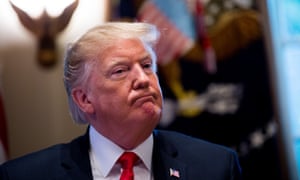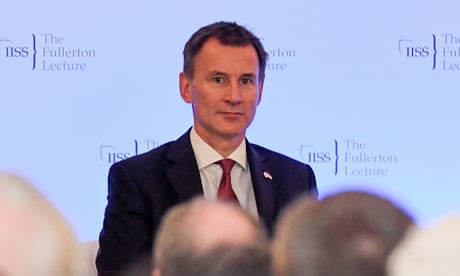Simon Jenkins
 For a Briton to spend time in the US just now is a blessed relief. Whole days pass, and no talk of Brexit. It is as if a pall has lifted from the art of conversation. But the US has its own deep divide, slashing through the populist body politic. It is Donald Trump and “America first”.
For a Briton to spend time in the US just now is a blessed relief. Whole days pass, and no talk of Brexit. It is as if a pall has lifted from the art of conversation. But the US has its own deep divide, slashing through the populist body politic. It is Donald Trump and “America first”.
Trump has become a phenomenon. Like Samson in the temple, he seems able to topple the entire edifice of policy. Down crashes America’s government machine for the sake of a wall, world trade is devastated, stock markets plummet, alliances lie in ruins. It is astonishing what one man can do to the world, virtually alone.
Assad will remain in power 'for a while', says Jeremy Hunt
 However, when an entire political establishment says a decision is mad, I tend to think something in it must be right. Thus with Trump’s announcement last month that he was pulling America’s 2,000 troops out of Syria. “They’re all coming back, and they’re coming back now,” he tweeted emphatically. That he could do this after an amiable chat with Turkey’s president, Recep Tayyip Erdoğan, and without telling his commanders, was staggering.
However, when an entire political establishment says a decision is mad, I tend to think something in it must be right. Thus with Trump’s announcement last month that he was pulling America’s 2,000 troops out of Syria. “They’re all coming back, and they’re coming back now,” he tweeted emphatically. That he could do this after an amiable chat with Turkey’s president, Recep Tayyip Erdoğan, and without telling his commanders, was staggering.
Trump instantly lost his defence secretary, James Mattis, and his Islamic State expert, Brett McGurk, the former effectively accusing Trump of no longer “protecting our way of life”. Abroad, the Kurds were devastated, the Afghans unnerved, and Iran and Isis reportedly delighted. Outrage came from Democrats and Republicans alike, with the leading Republican senator Lindsey Graham pleading to reverse a decision that “threatens the safety and security of the US”. Trump has now granted a stay of 120 days and a slower withdrawal.
Trump’s argument is that getting out of America’s wars was a campaign pledge. The Syrian intervention was never meant to be permanent and had already crippled Isis. “People are going to have to start doing a lot of their own work,” he added, “because the United States cannot continue to be policeman to the world.” To this, Britain’s foreign secretary, Jeremy Hunt, meekly retorted that the US should stay in Syria “to make sure the streets of Britain are safe”. How or why this should be, he did not explain. Years of American lives and treasure had done little beyond killing thousands of civilians and flattening some of the oldest cities on Earth.
The US must be the safest country on the planet. Its home territory has never been so much as menaced by a foreign power, let alone invaded
The morass in which the US is wallowing in Mesopotamia, as in Afghanistan, has indeed become indefinite. Retreat is always heartbreaking to friends, and pleasing to foes. It makes tearful, negative copy. Barack Obama tried to get out and lost his nerve. Trump is discovering why: it was through the vehemence and cynicism of pro-intervention lobbies, trumpeting national security.
Now comes the paradox. Trump sits in a White House war room, preaching the same “national security” he derides in Syria to justify his $5bn Mexican wall. Migration involves appalling suffering, on which Britain has no right to be smug. Britain has Shakespeare’s “silver sea, which serves it in the office of a wall”, where a few patrol boats will apparently suffice. But the issue is the same – how to honour populist election pledges to keep out migrants.
Trump is entitled to put “America first” in the Middle East, and that slogan may explain his trade barriers against Canada and China. But like the Mexican wall, such policies have nothing to do with America’s national security. The US must be the safest country on the planet. Its home territory has never been so much as menaced by a foreign power, let alone invaded. Two oceans protect it east and west. 9/11 aside, terrorist incidents have been homegrown. Wars abroad, from Vietnam to Syria, have reflected some neo‑imperial hegemonic urge, similar to that which used to grip Britain. The effect has been to turn the US from policeman to random vigilante.
The politics of fear has long been the default mode of the insecure statesman. The parading of military muscle still permeates the US’s public realm and has become a shop window for what President Eisenhower termed the anti-democratic “military-industrial complex”. Its endless aggrandisement boosts military spending and upholds the cause of an American presence across the globe. It worships daily at the altar of national security.

The halfway point: what have two years of Trump's wrecking ball done to America?
American aid to Nato has long underpinned Europe’s security, but that does not undermine Trump’s challenge, that the rest of the world should start solving its own problems. The US’s current entrapment in the Middle East was precisely what it warned Britain against over Suez in 1956, that it should not cloak imperial adventure in the garment of domestic security. Remarks to this effect by Mattis, Graham and Britain’s Hunt are ridiculous, and they know it.
The power of armies to dictate policy and command resources by exaggerating public fear is the downside of populism. As a lifelong admirer of the US, I have always marvelled at the good its power and wealth could do for the world. That is why its enslavement to Franklin Roosevelt’s bogey of “fear itself” is so tragic. That the quest for “stability” in the Middle East should be presented as remotely to do with the safety of the American or British state is a nonsense. For all his antics on the Mexican border, in this respect Trump’s voice is salutary.
• Simon Jenkins is a Guardian columnist
As 2019 begins…
… we’re asking readers to make a new year contribution in support of The Guardian’s independent journalism.
Three years ago we set out to make The Guardian sustainable by deepening our relationship with our readers. The same technologies that connected us with a global audience had also shifted advertising revenues away from news publishers. We decided to seek an approach that would allow us to keep our journalism open and accessible to everyone, regardless of where they live or what they can afford.
More than one million readers have now supported our independent, investigative journalism through contributions, membership or subscriptions, which has played such an important part in helping The Guardian overcome a perilous financial situation globally. We want to thank you for all of your support. But we have to maintain and build on that support for every year to come.
Sustained support from our readers enables us to continue pursuing difficult stories in challenging times of political upheaval, when factual reporting has never been more critical. The Guardian is editorially independent – our journalism is free from commercial bias and not influenced by billionaire owners, politicians or shareholders. No one edits our editor. No one steers our opinion. This is important because it enables us to give a voice to those less heard, challenge the powerful and hold them to account. Readers’ support means we can continue bringing The Guardian’s independent journalism to the world.
Please make a new year contribution today to help us deliver the independent journalism the world needs for 2019 and beyond.
No comments:
Post a Comment